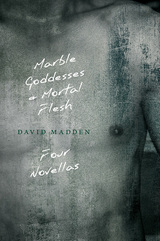
The Hero and the Witness is a harrowing and comic story of nineteen-year-old Lucius’s ordeal as a merchant seaman caught in the crossfire between an enigmatic scapegoat and a violent crew en route to Chile. In To Play the Con, Lucius, now a teacher and a first-time novelist, cons his little brother’s six small-town victims into accepting restitution for passing bad checks, a scam their older brother taught him and that may send him to the chain gang. Lucius works another con in Nothing Dies, but Something Mourns by persuading an ancient lady in a mountain town to tell him the romantic story of her brief love affair with Jesse James. In the innovative novella Marble Goddesses and Mortal Flesh, Lucius, now middle-aged and a successful novelist, buys the derelict Bijou Theater where he was a very young usher and becomes immersed to the brink of psychosis in memories of the immortal movie goddesses of the 40s and the mortal girls of his youth.
The novella is the perfect medium for this wide-ranging author to explore the power of the imagination and of oral storytelling in the lives of his characters. Madden’s unmatched scope in this collection could draw comparisons to Joseph Conrad, Henry James, Thomas Wolfe, and James M. Cain equally well.
Like Lucius, a native of Knoxville, DAVID MADDEN was an adolescent usher in the
1940s, a Merchant Mariner in the 1950s, and his two brothers were con men in their youth. He became a teacher in 1957, retiring in 2008 as LSU’s Robert Penn Warren Professor of Creative Writing, emeritus. Living now in Black Mountain, North Carolina, he has nearly finished a memoir recounting his youthful experiences in the U.S. Army.

The novella is the perfect medium for this wide-ranging author to explore the power of the imagination and of oral storytelling in the lives of his characters. Madden’s unmatched scope in this collection could draw comparisons to Joseph Conrad, Henry James, Thomas Wolfe, and James M. Cain equally well.
Like Lucius, a native of Knoxville, DAVID MADDEN was an adolescent usher in the
1940s, a Merchant Mariner in the 1950s, and his two brothers were con men in their youth. He became a teacher in 1957, retiring in 2008 as LSU’s Robert Penn Warren Professor of Creative Writing, emeritus. Living now in Black Mountain, North Carolina, he has nearly finished a memoir recounting his youthful experiences in the U.S. Army.
READERS
Browse our collection.
PUBLISHERS
See BiblioVault's publisher services.
STUDENT SERVICES
Files for college accessibility offices.
UChicago Accessibility Resources
home | accessibility | search | about | contact us
BiblioVault ® 2001 - 2024
The University of Chicago Press









